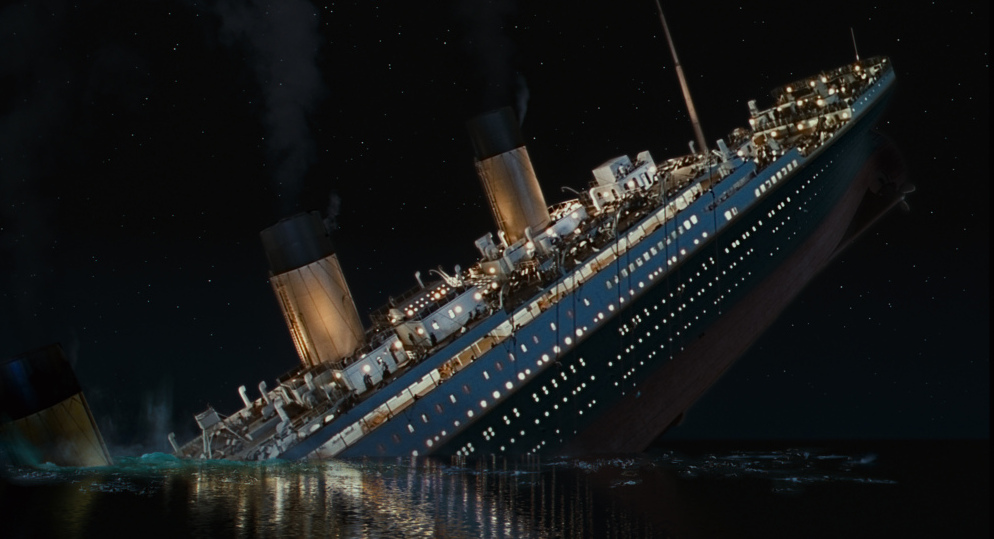“It is a Mathematical Certainty”

Remember that scene in Titanic, shortly after the ship hits the iceberg, where the officers and owners come to its designer Thomas Andrews, played by Victor Garber, to figure out what they can do about their current situation? And he explains that there’s nothing to be done. Too many compartments have been exposed to the sea and are taking on water. Things may look fine—the deck is still horizontal, the night is calm, everyone is treating the situation with good cheer and a modicum of patience. But the ship is still going to sink. It is, Garber says, “a mathematical certainty.”
That’s Twitter right now. We’re going to spend the next few months (weeks? days?) taking a perverse pleasure out of watching the company’s—or rather, its CEO’s—flailing. We’re going to mock its back-and-forth on verification, constant invention of new kinds of badges, and descent into unimaginable depths of impersonation and trolling. We’re going to shriek at the possibility of the FTC descending on the company for privacy violations. We’re going to scratch our heads at the idea that anyone would be stupid enough to give this company their banking information. But honestly, none of that is necessary, anymore, to sink the ship. Musk could do nothing from this moment on and Twitter would still be doomed. The iceberg has already hit.
By purchasing Twitter at such an exaggerated price, Musk loaded it with debt that it had no hope of being able to service. He then fired the majority of the company’s employees (while making the working conditions of the remainder significantly worse, thus all-but guaranteeing that those among them with options will be looking for the door). This not only makes it highly unlikely that Twitter will be able to roll out new features in a timely manner, it makes maintaining the old ones—whether that means content moderation or keeping the code base running—virtually impossible. He has alienated advertisers, the company’s only real source of income, who as it turns out didn’t really need twitter that badly, and were mostly sticking around out of inertia and because of connections with the company’s marketing executives—many of whom are now gone. And his solution to make up that shortfall is turning the platform into a subscription service. This ignores two important facts. First, that the people being asked to pay for a subscription are also the ones producing the content. And second, that in order to make up for the lost advertising revenue (much less increase revenues enough to service the company’s debt), he would need a double-digit percentage of twitter users to buy in, whereas the best-ever observed conversion rate is in the area of 2.5%.
There is simply no way to save a company in this condition. Bankruptcy is going to happen. I don’t know how long it will take to get there, what form it will take, and whether there will be some zombie Twitter still shambling along in its aftermath. But it is coming. It is a mathematical certainty.
When you say things like this, a lot of people—including front-pagers and commenters on this site—will respond with something along the lines of “good riddance”, and expound airily on twitter’s toxicity and uselessness. And frankly, I find that smug and not a little bit stupid. In the current state of the internet, with RSS effectively dead and Facebook a walled garden, there is no other platform for discoverability that isn’t ultimately about lifestyle, that allows people to just talk and share their experience and expertise. Even if you’re not on twitter, you’ve benefited from it. Every time you’ve been exposed to a new perspective, from activists, scientists, artists, or critics. Every time a self-satisfied pundit has found themselves getting cut down to size by people who actually know what they’re talking about. Every time a video or a photograph that the news wasn’t going to air has gone viral. And that’s just among people like us. In other parts of the world, or among marginalized communities, twitter has been an invaluable tool for connection and organization, for promulgating information and new ideas. There is nothing else that fulfills that need, and it will be a profound loss when it is gone.
As much as this is all Musk’s fault, I’d like one of the takeaways from this clusterfuck to be that it was, for the most part, entirely predictable. Between the amount of debt Musk was going to load Twitter with, and the layoffs he was promising, the Twitter board who accepted his purchase offer had to know that they were likely dooming the company. That their decision would lead to thousands of lives being materially worsened, and to millions of people all over the world losing a service they depend on for anything from simple pleasure to survival, all for the benefit of a handful of shareholders. And yet they apparently had to accept the offer, simply because it was so high. We should talk more about the fact that fiduciary responsibility running only towards the shareholders makes induced collapses like Twitter’s inevitable, and what can be done to prevent that.


